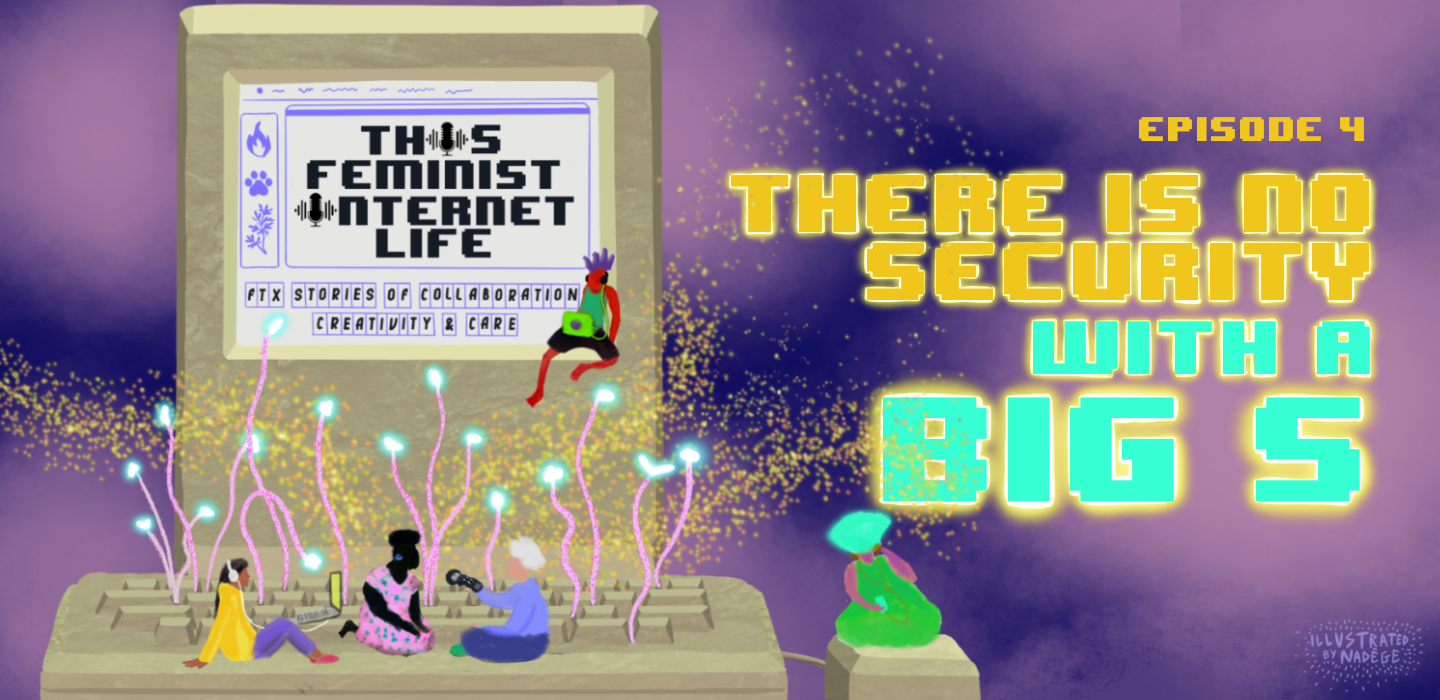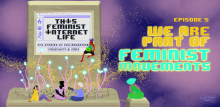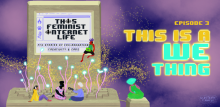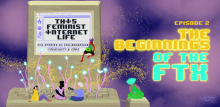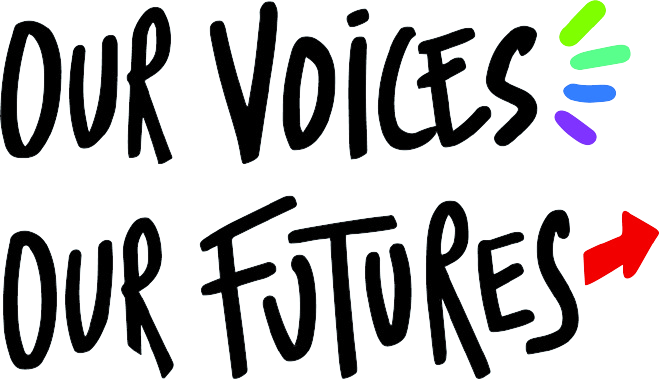There is no security with a big S
This episode is filled with tips and strategies from different feminists on how to create alternative infrastructures of care and embed affection into digital security trainings and most important, their lives, communities and movements. It challenges the notions of a one-size-fits-all prescriptive curriculum and/or training and invites activists to reflect on what safety and care means to them and their communities.
Sandra: I think that one of the things is that really, how terrible we were in taking care of ourselves, you know, the prices we were willing to get, especially queer women, lesbian women, and the different social justice movement were there on its front lines. So it's really the way, we were embodying the impact, you know, of that, the war that had on us, you know, or the conflict that had on us was immense, right?
So, and I think that it is back then where I committed myself somehow my political emotional commitment is really to be then to shift and change that. The culture. How we operate and how we understand our bodies, how disconnected we are from our bodies, yeah, and how to bring the body wisdom into our organizing, how to build collectively the collective liberation, you know, that we all talk about so much.
Narrator (Ray): Hi and welcome to another episode of This Feminist Internet Life, FTX stories of collaboration, creativity, and care. We are your hosts, Rachel Wamoto
Narrator (Jennifer): and Jennifer Radloff.
Safety is above all a feeling we get, a certain grounding we experience. That secures us the freedom to express ourselves and our struggles, and no matter what happens, we can rely on people and communities to shelter us and tools to mitigate harms.
Narrator (Ray): And as much as devices have become inseparable from activists and play a very important role in digital safety, it is mainly in the warmth of human voices and bodies that we feel secure. In this episode, we ask why digital safety and care?
Narrator (Jennifer): We listen to how different feminists are creating alternative infrastructures of care and why embedding care into our training is extremely important. We meet new voices from around the globe: Cynthia, Sandra and Indira, joining familiar voices, hvale, Fernanda, Erika, and Helen, as we explore safety and care in episode four.
Erika: I think when we talk about digital safety, we don't, you know, that's a very narrow viewpoint that is very device focused. And we're talking a lot about, you know, what about Our movement safety, what does our community need? How can we all be safe if we're taking a protest on the street? You know, how all of these things interconnect, especially if we're carrying devices with us.
So there's also a lot of reflection about what makes us feel safe as a collective, in our movements, in our society, as individuals, in our home relationships, in our work relationships, and exploring all of those facets can be really unsettling and scary, but can also be a very supportive process as we explore these different concepts of a more holistic take on safety, which I think is also something that happens in many of the trainings that we see feminists caring now.
Narrator (Ray): Fernanda Monteiro will tell us how the Transfeminist Network of Digital Care was born to address insecurities and fear that arose after the terrible execution of Rio de Janeiro's councilwoman, Marielle Franco, in Brazil. Marielle Franco was a human rights defender, a black bisexual woman from Maré slum. She fought hard for social justice and against police brutality and the militia.
Fernanda: In 2018, we were already planning to work towards digital security of the candidates, feminist candidates in the elections of 2018. So it was also a president election and federal election. So we were already concerned about their physical and the digital security of the feminist candidate from several roles in cyber society, for example, there were mandates for black feminist candidates, feminists coming from transgender activism and queer activism, and also working on gender based violence politics. The hate speech were going outside the digital environment and was going to physical spaces as well.
And the things were becoming more intense, and we were already starting to receive some reports and some solicitations of help from candidates, from people that were working with them in the campaigns and also other civil society activisms briefing, read out feminist movements that were concerned about the digital security, and we were receiving these requests from several organizations that were dealing with digital security, specifically feminist security based on feminist principles.
It happened the murdering of Marielle Franco in April and things became more urgent, like, we were already knew the circumstances, but that just showed our point about how physical security and digital security were connected, because it was like, she was first surveilled, a lot surveillance through the networks, the social media, like having their physical devices also surveilled before actually being murdered.
- Marielle Franco audio in portuguese: Não serei interrompida, não aturo interrompimento dos vereadores desta casa! Não aturarei de um cidadão que vem aqui e não sabe ouvir a posição de uma mulher eleita!
- A gente é um símbolo, é fruto de toda nossa luta que desde a década de 1980, 1990, a gente vem lutando e foi esse marco, infelizmente aconteceu essa tragédia, mas a gente vai continuar.
- Mulheres negras resistem!
- Translation: I will not be interrupted, I will not tolerate interruptions from the councilors of this house! I won't put up with a citizen who comes here and doesn't know how to listen to the position of an elected woman!
- We are a symbol, it is the result of all our struggle that since the 1980s, 1990s, we have been fighting and it was this a marking point. Unfortunately this tragedy happened, but we will continue.
- Black women resist!
Narrator (Jennifer): The Transfeminist Network of Digital Care gathered activists and organizations like Coding Rights and MariaLab to join their expertises and experiences And to develop methodologies of digital and holistic care to fill a demand for trainings in this complex reality Brazil faced after Marielle's execution, which was followed by a far right conservative government and then the global pandemic.
Fernanda: And so we just gather, gather it ourselves, like people from all these organizations and talked of measures, and initiatives to bring together a shared database of these cases and of request is also because everybody was like getting overwhelmed by these requests. Sometimes there were the same request just came to several organizations at once.
And we didn't have an actual tracking of what were the request is coming and what we are ready. We're working at, and this was the first reason because the Transfeminist Network joined it in, like being a central place for these organizations to work together and have a unified way to provide support for people.
But later, after the elections, after Bolsonaro became president, and we, we saw the risks is increasing. We also thought of the network as a place to... Provide some way to connect with other facilitators and other feminist people in Brazil that were dealing with digital security and emotional security to join and to grow together, in a way that could be also sustainable.
Narrator (Ray): Marielle's execution is still unresolved and the crime was unknown. But her legacy is very much alive, inspiring feminists from all over the world to speak up.
- Portuguese audio: Ventos inquietos dão sinal, tuas asas são pra voar além de Aruanda. Marielle vive!
- English: Restless winds give a sign, your wings are to fly beyond Aruanda. Marielle lives!
Narrator (Jennifer): And then... COVID 19 happened with massive changes in the way people lived, worked, socialized, cared for themselves and each other. And of course, how they managed to still facilitate digital care training and learning processes in a context of high demands for online safety. So let's hear about it in first person by the familiar voices of Smita, hvale and Helen.
Smita: I think COVID was an instance where... suddenly a lot of people were forced to go online almost overnight and not in a good way. And, and it did change everything, right? It changed how we work in general, it changed how we do training, it changed how we, you know, it's not that before COVID we were not thinking about care in trainings and workshops.
But this had to change drastically in the COVID time, and I think this was for both participants and how you run the workshop, but also for yourself as trainers and facilitators. I think one of the things which became clear after like the first online training I did during COVID, or the first online training that I was part of during COVID was that you can't do eight hour trainings. You can't do continuous sitting in front of a computer and expect people to listen. Right. And the first time I attended a training like that, after that, I think I really personally wanted to restructure how I do this.
So, you know, part of care would be one giving adequate breaks to connecting people to like, the physical spaces and bodies, three to like not focus on the literal number of hours that you're sitting in the room because that was not going to work. You cannot sit eight hours with a lunch break anymore, or like two tea breaks, you have to cut it down. You had to do three hour workshops, two hour workshop, which really then changed... How do you do this training?
hvale: For me was really a practice, I learned really to practice in with consistency. Maybe to say I renounced perfection, as a perfectionist, a former perfectionist, in that space and knowing that how precarious we all were and some more I eventually renounced to perfection, to this obsession with standard, with this having, you know, somehow, having a clear idea from here to there. No, it was the really kind of risk of experimentation was freed. Because the needs to be together was far more important.
Helen: COVID, I think for a lot of people, it has... You had to re imagine, you had to invent, reinvent yourself. How you teach, the strategies, the sessions. How you do exercises. Imagine an exercise you used to do hands on. Now you have to think of a version of that, which you can play on Zoom or whichever platform. And it pushes you. It is challenging to do online trainings.
It's very hard to evaluate the impact of the learning using with an online training, if you're not doing pre and post methodology. Also extended of the learning because then you can schedule check-ins. You can try and call people on WhatsApp and talk to them and say, "Hey, what did you get from that session?" If you don't have an opportunity with such with that community, maybe it's a one off training two days, then you can... you hope for the best.
Narrator (Ray): These conversations make us realize that it takes an entire infrastructure of care to be able to consistently reach people and initiate changes related to digital and holistic security.
You see, we are bodies behind screens and keyboards, and while our interactions may take place virtually, it takes deep human connections to keep these connections trusted and real.
Smita: Another change is also how I look at my own time and availability and energy. Because when you're doing online workshops, I think it takes a lot more of you than when you are doing in person workshops in a different way.
Because it's not physically exhausting necessarily, but mentally it's very, very tiring. I remember like the first few times when... I was discussing rates with someone for a particular training. I told that the workshop will be for four days, four hours in a day, the fees will be for the whole day because after those four hours of a workshop, neither me nor my co facilitator can really go and do anything else. And both of us were consultants at that point. So yes, we will be charging for the full day, but we are reimagining how we're doing these workshops now. So we will not be like, and that is really important.
And this is a conversation which maybe organizations, facilitators, and donors need to have, because you cannot pay people in the same way as before. That one day of work means eight hours of your work directly, right? It may, it is. Now, maybe four hours of training and four hours of like prep and your own care and post and pre work, right?
I think these were some changes which came about which are also really important for facilitators to think about for themselves because it was exhausting. Right.
hvale: Because I truly believe that online can be embodied. And I think that COVID, for myself, proved it. But it also proved that as a different dimension, tiredness, fatigue, this obsession, not? to go because everything is one click away. And so this putting so many things one after the other. So, I think that it make even more clear and visible how we were pushing ourselves too much. So for me, somehow, the digital gained a more visible account of the fatigue.
Erika: It is interesting to think about the way that technology... the way we relate with technology and the way it might be making our bodies feel. Reminding ourselves about our bodies, because there are so many processes that are being activated, in neurological processes, you know, uh, body position, et cetera, whenever we interact with technology that actually take us away from our bodies.
So I think that one of the ways that we do bring care into training is reminding ourselves about our bodies and how we are and how our bodies might change how, how our position changes, bringing us back to ourselves, even as we interact with the technology and making sure that that acceleration that comes so frequently technology isn't one that we have to bow to, you know, that we can separate from it and focus more on ourselves and our needs, in that context and be aware too about how this process of everything has to go online and the government putting all services online and the pressure that is on so many communities, for example, that are still not connected, and this feeling of missing out, you know, just looking at people's environments and contexts and realities with them and talking about that relationship with technology is another element of care, but also just even reflecting a bit on how our bodies are doing as we're in these processes.
Cyn: For me, the way that I've been witnessing and experiencing it these days is that we all need support and different areas of our lives. And if we are doing sensitive work that relates to activism, human rights, you know, preventing violence or addressing violence or even mending spaces or creation of spaces. Every aspect of our lives demands that we are present and our experiences can shape us in a way that can take us out of our bodies or out of our own natural way of being compassionate and understanding. And if we look at the world that is being shaped today and how fast things have become, how fragmented our communities have become across the planet, it's not just about one particular place, but there's a really deep wound when it comes to our relationships and how we are really being formed by a system that is telling us, "just look out for yourself", the work that we have been doing and this word that we call care, which, for example, in my own emotional language does not really resonate, right? Like, not even trauma resonates with these experiences, but how do we address whatever makes us tense or whatever makes us not be able to carry on the work that we need to do. And how do we also take care of each other so that we can form different technologies? And these technologies are quite wide. And really remind ourselves that we need to be safe, that safety with a big S does not exist, but that we can create safer spaces for each other.
Narrator (Jennifer): The voice you just heard from Lebanon is Cynthia, APC's Gender and Women's Engagement Coordinator in the APC Community Networks Project. As Cynthia claims, safety with a big S, the way traditional digital security spaces frame it, doesn't exist and feminist tech trainers have realized that without self and collective care, there can't be safer spaces. So slowly the practices and narratives have started to change moving from the fear driven technology approach to embodied practices of care. That takes into account feminist values like intersectionality, inclusivity, reflexivity, and positionality. Importantly, it considers joy, kindness, and excitement as pillars that build these spaces.
Let's hear some tips from digital care trainer Indira and more from Helen and Fatima.
Indira: I think at the beginning, it was also kind of like the idea of opening like these spaces. And I think it was recognizing that these other narratives existed and that that wasn't working for me. So, and also being to me, that was care for me at the beginning, you know, it was like being responsible, but also being comfortable with what I could share and what I could support on. Starting to recognize that so that even though it sometimes it was like a lot of work, you know, it was also something that I was enjoying, like every time that we would call or create or open a space to me, it was something that I was really happy and like really... I don't know, like, I don't know... To me, it was like a place. Those were places that felt really safe for me and joy. It was kind of like seeing how different these spaces were from these other tech spaces that had other practices that I didn't feel comfortable in, you know, like, how technology can also create these spaces of, like, you know, like, competitivity. And I wasn't really comfortable in those spaces.
So I will make sure, or like, yeah, that to set up the space, in a place that will be comfortable for the people coming. And also, I think, to be honest, for me also, the part of the care, it also came from this journey of acknowledging all of the different things that were stressful in my life, you know, like all of these different things I wanted to change, like this of owning my own voice, you know, like making, recognizing that I can also use the tools, kind of like making pieces with all of this in myself, so I would make sure that was also a space where other people who also felt like that could join and be comfortable.
Fatima: You know, it's about creating mentorship programs. It's about creating groups of people that feel comfortable to work with one another. It's about remembering what it felt like the first time you touched a computer and how scary it felt. But also how when you did realize the power you had and what you could do with it. So it's kind of bringing all of that to our training, I think. So, you know, it talks to the approach of how you bring in somebody new to an area of work, and sometimes it's not about the technology itself, but it's about what you can do with it. And just using those examples that we learn in everyday life to our training, making it more human, and not so much about the technology also, it's just bringing this human element to it. And I think we continue to do that. We learn new ways of doing it all the time. We learn from stories and our interactions with people that we've trained with and learned from. And we bring that to the way we approach training for ICTs.
Helen: It's maybe the logistics in the entire thing, logistics, especially for participants. If you're getting them there to a place, making sure that the collective care, maybe not self care, but the collective care is felt and they feel it throughout. How they get there in the communication you've given them, do they, are you on the same page?
Do they feel like all their answers? All their questions have been answered being there. How you manage that time. Are you teaching in a way that is relaxing and enables the individual to not to stress because they come to you? They've left obviously their lives and stressful lives, and then they've come to the workshop, and then there's this new form of stress and anticipation and expectation.
So for me it would be trying to work, trying to work on that as much as possible, because as the trainer, it also impacts you. A bit of work after also can go into how you manage yourself, because if not, for example, trying to offload. Most of, try to bring closure to the whole workshop as soon as possible, so that you have a chance to break, separate your brain and get on to other things without keeping something agape, pending work. So also that one I think would be a care.
Indira: I remember one of the trainings, in some trainings, people would like, be more like, feel more, or go organically into these, like, either practices or games or activities,and in other cases, it was very far from what they would do. So they would kind of, like, start in the activity not recognizing what was going on.
But then liking this experience of, like, stopping and let's talk about our week, you know, like how it was. For us, and I remember in a in a training with women journalists that some of them were like, "What are we doing now? Where are we talking about our personal lives?" I was always like, if you feel comfortable, if not, it's just like, you know, like, have some breathes, be a bit more grounded and let's go into into the matter of the training. But it was really nice to see how sometimes these practices, if we share them with the people who were in these spaces, in these trainings, it was something that they recognized that they enjoyed as well.
Narrator (Jennifer): It's just really interesting how in movements and queer activism in particular, that there was not this awareness of how trauma can impact the body and how we need to work with it. And it's something that, you know, when we work with a feminist internet, we try and say, okay, so there are all these insecurities and violences, but actually we need to reclaim it with joy. So it kind of is putting me in mind of how that is so important to kind of inhabit joy as something as well within the work that we do. And that can also lead to a form of healing.
Sandra: When it comes to me, when I think of it, I really think about revolutionary love. That's it. That's really all I can think about. Like really, how do we embody revolutionary love? How do we embody the liberation we all long for? We all talk about. Yeah. How do we emerge in connection with another human? Yeah. From our hearts. Yeah. How do I recognize my uniqueness? How do I recognize I'm not special, but I am unique? Yeah. The way. There is no two of me, yeah?
There is just this one, the way I navigate, I filter, you know? I am in this world, right? And then how I can speak to that in another human, in another activist, in another collective, in the way really what we are working towards, you know, how we interconnect to the whole life. Yeah, so for me, if we talk about the infrastructure of care is the infrastructure of whole life.
Cyn: I feel that our work is about reminding folks that it does matter and that maybe change will come, not in our lifetime, but that we are. Creating positive change every day in our own way and really remind ourselves that we need to be safe, that safety with a big S does not exist, but that we can create safer spaces for each other, and that we also need to come with, you know, that it's okay that we have harmed also each other if at some point we were in pain and we caused pain that we need to find space to have difficult conversations and and grow from there, whether through repair or through agreeing that maybe this relationship needed to end. But what we need to do is to be able to look each other in the eyes and actually have these difficult conversations, which I feel a lot of the feminists and other spaces that don't necessarily call themselves feminists have been trying to do.
And I think that this is a sign of health. And this is a sign that all the work that, you know, Sandra mentioned that she's been doing this for 25 years. You know, so many people have been doing this and I feel like we are also aggregating a lot of wisdom from those who have been doing this work and just this, just thinking about this makes me feel that we are not alone.
Narrator (Ray): And there we have it. We would like to take this time to thank Sandra, Cynthia, Fatima, Erica, Indira, Fernanda, Helen, hvale, and Smita for their wonderful contributions to this episode. Tune in for our fifth and final episode, where we honor and acknowledge the crucial contribution of feminist tech trainers and facilitators to feminist movement building.
Narrator (Jennifer): What is it like being a techie trainer in feminist movements? When did they discover that they were a trainer? What their first training was like? And how they felt when they held space for activists exploring the sometimes complex world of training with the internet and technology. What are some of the stories of learning from participants being part of a network of feminist trainers and constantly innovating methodologies, tactics, and strategies in the ever evolving field of shrinking civil society space and advancements in technology and related issues?
Narrator (Jennifer): See you next time. Bye.
Narrator (Ray): See you next time.
